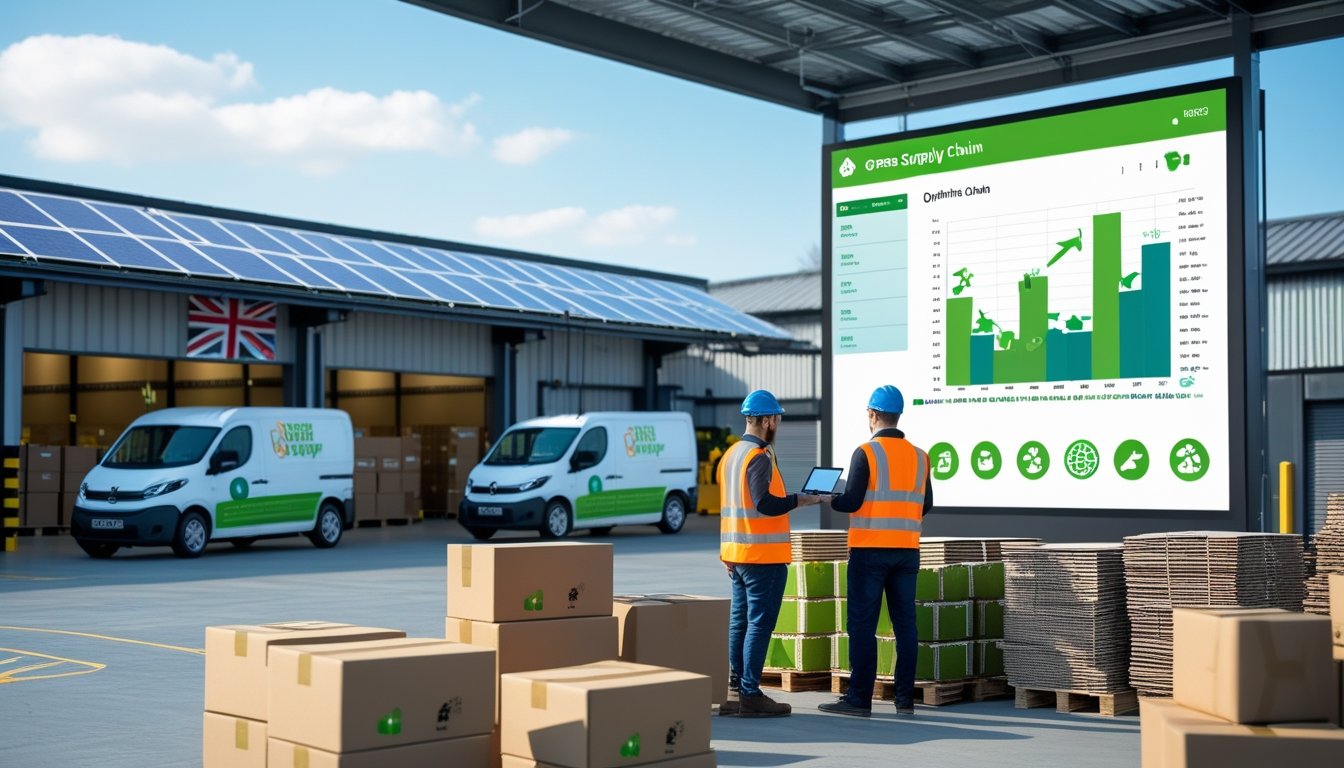Late updated: 28 Jul 2025 15:07
Written by: Amber Collins
Optimising Green Supply Chains for UK Businesses: Strategies for Sustainability
As businesses in the UK navigate the complexities of modern commerce, the importance of sustainable supply chains has never been more critical. Not only are green supply chains pivotal in reducing environmental impact, but they also offer a strategic advantage in meeting evolving regulatory demands and consumer expectations. Focusing on optimising these supply chains can lead to improved efficiency, resilience, and innovation.

Green supply chains encompass a multifaceted approach, involving key elements such as ethical sourcing, energy-efficient logistics, and technological integration. As we align with environmentally sustainable practices, the potential to enhance brand value and economic gains becomes tangible. By investing in green technology and forming strategic partnerships, UK businesses can significantly reduce their carbon footprint.
Engaging with sustainable suppliers and adopting green technologies like electric vehicles offer impactful steps towards greener supply chains. As the move to sustainability becomes a priority, we stand at the forefront of change, ready to reap the rewards. Let's explore the pathways to achieving this transformation.
Key Takeaways
- Green supply chains boost efficiency and meet regulatory and consumer needs.
- Sustainable practices enhance brand value and economic benefits.
- Electric vehicles and strategic partnerships are effective green steps.
Key Strategies for Optimising Green Supply Chains in the UK
To enhance the sustainability of supply chains in the UK, we must prioritise reducing carbon emissions, fostering productive supplier relationships, and integrating new technologies and processes. These strategies are crucial for minimising our environmental impact and ensuring a sustainable business future.
Reducing Carbon Footprint Across Supply Chains
We can significantly lower carbon emissions by optimising transportation methods. Electrifying transport fleets plays a vital role in this effort. By implementing advanced route optimisation technologies, we can further enhance efficiency across the supply chain.
Strategic location of warehouses also contributes to reduction efforts. Placing distribution centres closer to end-users reduces travel distance, conserving energy and resources.
Sustainable packaging is equally important. Using recyclable materials and designing for minimal waste can substantially cut down the supply chain's carbon footprint.
Sustainable Supply Chain Collaboration with Suppliers
Effective collaboration with our suppliers is critical to achieving a sustainable supply chain. By working closely with those prioritising environmental responsibility, we can align on sustainable goals and practices.
It's essential to communicate clear sustainability criteria for suppliers. This may involve adopting common sustainability standards and promoting transparent reporting practices.
Joint initiatives like supplier training programmes and shared sustainability projects can enhance our suppliers' capabilities. Building robust relationships ensures our supply chain's commitment to environmental goals.
Integrating Sustainable Processes and Technologies
Embracing modern technologies is key to developing a sustainable supply chain. Innovations such as Internet of Things (IoT) solutions enable us to monitor and improve efficiency, while AI can optimise resource usage and predict disruptions.
Circular economy principles should be integrated, encouraging reuse and recycling of materials. This not only reduces waste but also conserves resources.
We should adopt sustainable procurement practices, selecting materials with a lower environmental impact. By leveraging green technologies and processes, we position ourselves for a future that prioritises sustainability and resilience.
Frequently Asked Questions

In optimising green supply chains for UK businesses, integrating ESG considerations, adopting environmentally responsible procurement, and measuring logistics sustainability are crucial steps. Effective engagement with suppliers and strategies to reduce carbon footprints can enhance resilience and eco-friendliness.
How can UK companies integrate ESG considerations into their supply chain management?
To integrate ESG considerations, we must first assess our suppliers' adherence to environmental standards and ethical practices. Regular audits can ensure compliance with legislation and promote transparency. It is also important to establish clear ESG goals and track progress through relevant metrics. Collaborating with suppliers to align practices with these goals is essential for long-term sustainability.
What are the best practices for environmentally responsible procurement in the UK?
Adopting environmentally responsible procurement involves selecting suppliers who demonstrate a commitment to sustainability. We should prioritise materials that are recycled, sustainably sourced, or have lower environmental impacts. Engaging in life-cycle assessments enables us to understand the environmental effects of products, helping us make informed decisions and reduce our environmental footprint.
What is the Environmental, Social, and Governance (ESG) framework and how does it apply to supply chains?
The ESG framework is a set of standards evaluating a company's commitment to sustainable practices. It encompasses environmental conservation, social responsibility, and governance structures. In supply chains, we utilise ESG criteria to guide ethical sourcing, reduce environmental impact, and uphold social standards. This helps us build more responsible and resilient supply networks.
How can businesses in the UK measure and improve the sustainability of their logistics operations?
We must analyse our logistics operations by measuring emissions, energy consumption, and waste generation. Implementing energy-efficient technologies and optimising transportation routes can lead to significant improvements. Switching to renewable energy sources and adopting circular practices are effective strategies. Regular assessments and embracing innovations ensure continuous enhancements in sustainability.
In what ways can UK businesses engage suppliers on sustainability to enhance supply chain resilience?
Engaging suppliers involves clear communication of sustainability expectations and collaborative goal-setting. We can provide training and resources to support suppliers in their environmental initiatives. Developing joint projects and sharing best practices fosters a mutual understanding of objectives. Building strong relationships enables us to enhance the resilience and sustainability of our supply chain.
What are some effective strategies for reducing carbon footprint in UK business supply chains?
To reduce our carbon footprint, we should prioritise the use of low-emission transport options and consolidate shipments. Incorporating energy-efficient warehousing techniques and optimising stock levels reduces waste. Encouraging the adoption of green logistics and investing in renewable energy are impactful measures. By continually assessing and refining our strategies, we can significantly lower our environmental impact.
